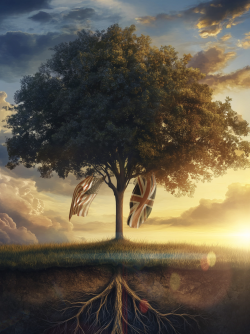Christopher Columbus: Facts and Fictions
What can we learn from taking an unvarnished look at the man who “discovered” America?
If you grew up in the United States in the last half of the 20th century, Christopher Columbus was likely one of those figures who seemed almost too good to be true when you learned about him in school—an intrepid discoverer of new lands, a noble pioneer.
And he was certainly popular. Columbus Day celebrations have been regular events since the mid-19th century, but only in 1971 did it become an official national holiday in the U.S., fixed to the second Monday in October. This year, it will fall on Monday, October 13. For millions of Americans of Italian heritage, Columbus Day remains a source of ethnic pride, even though there was no united Italy before 1861—Columbus sailed as a citizen of the city-state of Genoa. In recent years, however, many who deplore Columbus’ voyages have begun to observe the same day as Indigenous Peoples Day, a holiday that began in 1992 in Berkeley, California, and quickly gained celebrants across the nation.
Many choose to celebrate one holiday or the other, and a rare few observe both holidays together. But what will they be honoring—and why?
Fake News?
Anyone following today’s media has heard the term “fake news,” and almost everyone has heard or read their share of it. Some is laughably extreme: One political candidate “eats babies,” while another “is an alien reptile wearing a human suit.” But most misinformation is far more subtle, playing on people’s fear and ignorance in the cynical hope of manipulating them to support one cause or another.
And this is not a new phenomenon. Bible students will recognize that the corrupt leaders of Jerusalem’s Jewish community spread fake news about Jesus Christ, with the help of Roman guards who were complicit in slander of the Logos made flesh (see Matthew 26:59–61; 28:11–15).
Fake news can make a hero of an ordinary man or turn a former hero into a villain. And it can be fickle; just look at how Elon Musk has veered between villain and hero in popular perceptions. We can also see this in how history has treated Columbus. Was he the first globalist, seeking to oppress native Americans and steal their wealth? Or was he the spark that ignited a new era of wealth and growth that would benefit the whole world? Or was he perhaps a little of both? Let’s look at the facts.
Why Did Columbus Sail?
Before 1453, European traders could travel overland to India and China in relative safety, thanks to treaties between the Byzantine Empire and the Mongol Empire. But when Constantinople fell to the Ottoman Empire and Byzantium collapsed, traders needed sea routes instead. Had there still been safe land passage across Eurasia, Columbus might not have sailed.
Contrary to what some today assume, Columbus and most other Europeans of his day understood that planet Earth is a sphere. This was, in fact, ancient knowledge. The Greek philosopher Aristotle, in the fourth century BC, knew that planet Earth is spherical, and the Greek scientist Eratosthenes measured its circumference accurately in the third century BC. Both men were known to medieval scholars. In fact, Aristotle was so well respected that his entire world-view, not just his scientific knowledge, had come to shape much of the Roman Catholic philosophy that prevailed in Columbus’ day. Columbus understood the dangers of lengthy sea voyages, but falling off an “edge” of the earth was not one of his fears.
Roaming Catholicism
We should also consider the religious and political environment of Columbus’ time. From AD 711 to 1238, large portions of the Iberian Peninsula had been under Muslim rule, and not until 1492—the year of Columbus’ first voyage—did Catholic armies reconquer Granada, the last Muslim stronghold in Spain.
It was in this environment that Pope Nicholas V in 1452 had issued the papal proclamation Dum Diversas, which allowed the enslavement of “Saracens [Muslims] and pagans and any other unbelievers.” Furthermore, in 1493, Pope Alexander VI issued his proclamation Inter Caetra, ruling that one “Christian” nation did not have the right to establish dominion over lands already dominated by another Christian nation. Together, these papal decrees fueled a desire to explore “new” lands where the discoverer would have free rein to dominate resources and peoples. Growth of the Ottoman Empire may have spurred Columbus’ voyages, but the papacy gave him new scope for finding profit overseas.
What Did Columbus Discover?
Columbus did not reach India, though native Americans came to be called Indians because of his mistaken belief that he had arrived at what we now know as the East Indies. Not until Amerigo Vespucci’s voyages—after which “America” became his namesake—did Europeans understand clearly that Columbus had not found a convenient western sea route to India but had instead reached another continent.
During each of Columbus’ four voyages, between 1492 and 1504, he encountered warring native tribes and sought alliances where he could. On the island of Hispaniola, Columbus met the Taíno tribes that at first welcomed him as an ally against the Caribs, whom they despised as a violent tribe of cannibals—though scholars to this day debate whether the charge of cannibalism was “fake news” that the Taíno spread in order to defame their enemies and encourage their enslavement.
History shows Columbus to have been a diplomat, not a rapacious conqueror. Yes, he pressed the Taíno into dangerous gold mining, and many fell victim to disease and injury. But it would be a mistake to brand Columbus as simply a racist; the record shows that he also acted brutally against Europeans who dared to oppose him—one shocking report depicts him having the tongue cut out of a Spanish woman who insulted his ancestry. While Christopher Columbus may have been a cruel leader at times, he was not the genocidal maniac that many depict him to be. Contemporary accounts of Columbus’ activities—such as those by Bartolomé de las Casas, noted for his defense of the Taíno—report that while Spanish settlers committed their share of atrocities, Columbus would at times intervene in support of the natives and punish Spanish aggressors.
Plunderer, Warrior, or War Criminal?
Was Christopher Columbus a war criminal, the Pol Pot of his day? If he sought a reputation for lording Spanish power over indigenous peoples, we must consider him a failure.
During his 1492 voyage, Columbus established on Haiti’s north coast a fortress known as La Navidad. In December 1492 he staffed the new settlement—the first European colony in the Americas since the time of Leif Erickson—with nearly 40 men and extensive provisions, observing in his journal, “I am certain the people I have with me could subjugate all this island… the population are naked and without arms and very cowardly” (“Columbus’ La Navidad,” AmericanHeritage.com, accessed June 5, 2025). Yet when Columbus returned to the colony in November 1493, he found it burned to the ground, desolate but for the bodies of several settlers who had been killed by a Taíno leader after the Europeans fell to quarreling.
Did Columbus give up? Or did he make war against the Taíno? No! He established another colony to the east—naming it La Isabella in honor of the Spanish queen—from where he hoped the settlers could mine precious metals. But the new colony fell victim to hunger and disease and was soon ravaged by mutinous settlers.
Despite these complexities, it is remarkable to see how easily Columbus’ reputation has been tarnished by modern critics seeking to further their political and social agendas.
Christopher Columbus’ Impact on History
Some historians suggest that Chinese explorers reached the west coast of North America as early as 1421, decades before Columbus’ voyages. It is well known that Viking explorer Leif Erickson reached the east coast of today’s Canada hundreds of years before that. And we know that indigenous peoples were in the Americas for thousands of years before they saw any European settlers.
So, what sets Columbus apart? In the words of scholar Hans Selye, “The important difference between the discovery of America by the Indians, by the Norsemen, and by Columbus is only that Columbus succeeded in attaching the American continent to the rest of the world” (From Dream to Discovery: On Being a Scientist, 1964, p. 89). Europeans brought much more to the Americas than their diseases, and they returned to Europe with new plants and new foods—potatoes, tomatoes, peppers, pineapples, peanuts, and more. When we think of Ireland’s devastating potato famine of the 1840s, how many of us consider that the potato was at first an import from the Americas that had brought new vitality to Irish agriculture?
By connecting Europe to the Americas, Columbus set in motion another momentous change. For centuries, Europe had looked inward, to its own ancient past, as the measure of what could be known or achieved. It is no coincidence that so many great scientific discoveries followed in the wake of Columbus and other explorers who showed Europeans that there was new knowledge to be found outside of the dusty old books of European history.
Truly, the reality of Columbus doesn’t match the caricatures presented by his opponents—or by his supporters. Columbus was far less of a barbarian than many other Spanish settlers who would plunder the Americas in the decades that followed. He was a friend to at least one tribe, and to many indigenous individuals. Yet, contending against cannibals and warriors, Columbus was no milquetoast—he did not hesitate to kill his enemies when he could. We should also remember the other side of that equation. Before Columbus arrived, indigenous tribes were routinely at war with each other, showing no less hesitation to kill each other than Columbus displayed when confronting his enemies.
Focus on the Truth
Where is God in all of this? We read, “Behold, the nations are as a drop in a bucket, and are counted as the small dust on the scales; look, He lifts up the isles as a very little thing” (Isaiah 40:15). Yes, even when humanity rejects His ways, God has the power to bring about His purposes, whether through triumphs or tragedies. To learn more about God’s interventions in human history, we invite you to read our vital booklet Prophecy Fulfilled: God’s Hand in World Affairs. You can find it online at TomorrowsWorld.org or order a free printed copy from the Regional Office nearest you, listed on page 4 of this magazine.
So, is it wrong to celebrate Columbus Day or Indigenous Peoples Day—or both, or neither? No! As we have seen, most who celebrate Columbus Day or Indigenous Peoples Day share a startling range of misconceptions. But should this surprise us? As regular readers of this magazine understand, we live in a culture where countless millions of people call themselves Christians while celebrating holidays that are not only full of misconceptions, but that in fact go against the teachings of Jesus Christ.
We increasingly live in a world in which facts are not allowed to speak for themselves. It seems everyone has an agenda, and “truth” is only welcomed if it agrees with that agenda. But a time is coming when myth, fable, and political agendas will be replaced by a dedication to truth in all areas of society. For at Christ’s return, the world will come under the Kingdom of God—and He is a “God of truth” (Deuteronomy 32:4)!






